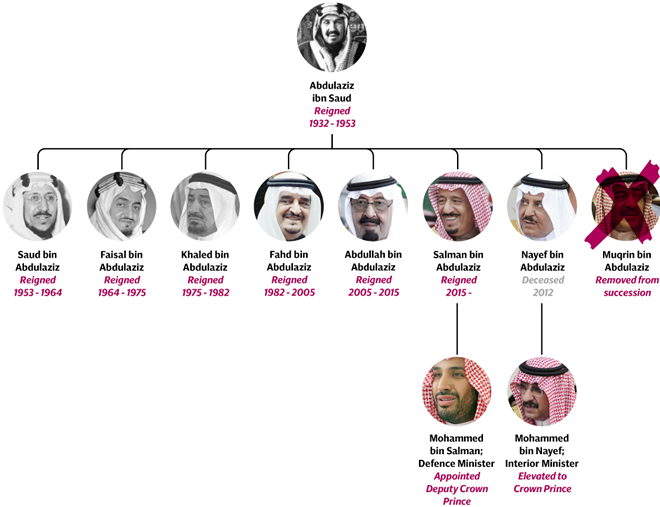

by David Blair, Chief Foreign Correspondent
Thursday, April 30, 2015
The rulers of Saudi Arabia prize consensus and avoid big decisions. If political change comes at all, it happens only with glacial speed - particularly if the monarch is old and sick.
Such were the standard assumptions about Saudi politics which King Salman has now overturned with remarkable speed. On Wednesday, this frail 79-year-old, who only ascended to the throne in January, executed a Saudi version of a palace revolution by suddenly altering the line of succession.
Until now, the kingship has always passed between the sons of Abdulaziz ibn Saud, the founder of the state who died in 1953. This arrangement obviously came with a time limit, but the current king’s predecessors doggedly resisted the obvious option of jumping a generation and lining up a grandson for the succession.
If the 37 sons of ibn Saud were divided into factions, after all, then what vipers’ nest might be opened if the hundreds of grandsons were allowed to fight over the throne? But King Salman has grasped the nettle by decreeing that the next king will indeed be a grandson in the form of Prince Mohammed bin Nayef, the interior minister.
Prince Muqrin, the youngest living son of ibn Saud, had been lined up to inherit the throne. Now the king has ruthlessly shoved him aside. For good measure, Prince Saud al-Faisal, the foreign minister, has also been relieved of his duties after no less than 39 years in position.
Prince Saud, 75, has been suffering from a spinal condition and the official story that he asked to retire may well be true. Yet he was the longest serving foreign minister in the world and a fixture of Saudi diplomacy since the days when Gerald Ford was in the White House and Harold Wilson in Downing Street.
Prince Saud’s departure coincides with Saudi Arabia becoming far more assertive. In the last month alone, King Salman has sent Tornados to bomb Yemen - launching one of the biggest military operations in the kingdom’s history - and tipped the balance of Syria’s civil war by supplying a new rebel coalition.
Along the way, Saudi Arabia has also taken a crucial decision to drive down the oil price, thereby hammering the economies of Russia and Iran. A country that was once supremely cautious, exerting its influence only in the shadows, is openly wielding every lever of national power.
Why the change? Fear of Iran's ambitions is the biggest part of the answer, but Saudi Arabia’s bitter rivalry with the Shia power on the far side of the Gulf is hardly new. What has changed is the Saudi assessment of America. In the past, the kings in their palaces in Riyadh felt they could rely on the US to guarantee order in the Middle East and underwrite their country’s security.
Today, King Salman clearly believes that era is over. He judges that America is retreating from the region, leaving the kingdom to look after itself. All the decisions so artfully avoided by his predecessors have suddenly become unavoidable. The old king, contrary to every expectation, is showing his willingness to take them.